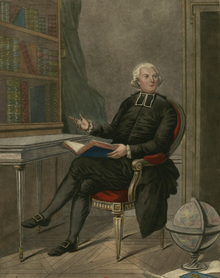Jean-Sifrein Maury

Jean-Sifrein Maury (26 June 1746 – 10 May 1817) was a French cardinal, archbishop, and bishop of Montefiascone.
Biography
The son of a very poor cobbler, he was born on at Valréas[1] in the Comtat-Venaissin, the enclave within France that belonged to the pope. His acuteness was observed by the priests of the seminary at Avignon, where he was educated and took orders. He tried his fortune by writing éloges of famous persons, then a favorite practice; in 1771, his Éloge on Fénelon was pronounced by the French Academy as second only to that by La Harpe.
The real foundation of his fortunes was the success of a panegyric on Saint Louis delivered before the Académie française in 1772, which caused him to be recommended for an abbacy in commendam. In 1777 he published under the title of Discours choisis his panegyrics on Saint Louis, Saint Augustine and Fénelon, his remarks on Bossuet and his Essai sur l'éloquence de la chaire,[2] a volume which contains much good criticism, and remained a French classic through the nineteenth century, as long as elegant rhetoric was valued in the pulpit. The book was often reprinted as Principes de l'éloquence. He became a favorite preacher in Paris, and was Lent preacher at court in 1781, when King Louis XVI said of his sermon: "If the abbé had said only a few words on religion, he would have discussed every possible subject."
In 1781, he obtained the rich priory of Lyons, near Pronne; and in 1785 he was elected to the Académie française as Lefranc de Pompignan's successor. His morals were as loose as those of his great rival Mirabeau, but he was famed in Paris for his wit and gaiety. He was elected a member of the Estates-General of 1789 by the clergy of the bailliage of Péronne,[3] proving from the first to be the most able and persevering defender of the ancien régime. (He had, nonetheless, drawn up the greater part of the cahier of the clergy of Péronne which contained a considerable programme of reform.) It is said that he attempted to emigrate both in July and in October 1789, but after that time, deserted by nearly all his friends, he decided to remain in France.
In the National Constituent Assembly he took an active part in every important debate, combating with especial vigour the alienation of the property of the clergy. His life was often in danger, but his ready wit always saved it and it was said that one bon mot would preserve him for a month. When he did emigrate in 1792, he found himself regarded as a martyr to the church and the king, and was at once named archbishop in partibus; extra nuncio to the diet at Frankfort; and, in 1794, cardinal. He was finally made bishop of Montefiascone in Italy, where he settled down briefly, but in 1798 the French drove him from his retreat, and he sought refuge in Venice and St. Petersburg.
Next year he returned to Rome as ambassador of the exiled Louis XVIII at the papal court. In 1804, he began to prepare his return to France by a well-turned letter to Napoleon, congratulating him on restoring religion to France once more. In 1806 he did return and in 1807 was again received into the Academy; and in 1810, on the refusal of Cardinal Fesch, was made Archbishop of Paris. He was presently ordered by the pope to surrender his functions as archbishop, but refused. On the Bourbon restoration toward the end of 1814, he was summarily expelled from the Academy and his archiepiscopal palace.
Maury retired to Rome, where he was imprisoned in the Castel Sant'Angelo for six months for his disobedience to the papal orders. He died in 1817, a year or two after his release, primarily from disease contracted in prison.
As a politician, his wit and eloquence made him a worthy rival of Mirabeau. He sacrificed much to personal ambition, yet remained publicly unremembered by Louis XVIII as a courageous supporter of Louis XVI and by the papacy as the one defender of the Church during the States-General.
The critic
As a critic, he was and is considered a very able writer. Sainte-Beuve gives him the credit of discovering Father Jacques Bridayne and of giving Bossuet his rightful place as a preacher above Massillon.
References
- ^ Herbermann, Charles, ed. (1913). . Catholic Encyclopedia. New York: Robert Appleton Company.
- ^ "Essay on the eloquence of the pulpit".
- ^ Besterman, Theodore (1986). Studies on Voltaire and the eighteenth century. Oxford: The Voltaire Foundation at the Taylor Institution. p. 324. Retrieved 14 January 2012.
Maury represented the clergy of Péronne (Somme) at the Constituent Assembly....
This article incorporates text from a publication now in the public domain: Chisholm, Hugh, ed. (1911). "Maury, Jean Siffrein". Encyclopædia Britannica. Vol. 17 (11th ed.). Cambridge University Press. pp. 915–916.
Further reading
- Œuvres choisies du Cardinal Maury (five volumes, 1827).
- Correspondance diplomatique (two volumes, Lille: Ricard, 1891).
- Louis-Siffrein Maury (Maury's nephew), Vie du Cardinal Maury (1828).
- Jean Poujoulat, Cardinal Maury, sa vie et ses œuvres (1855).
- Sainte-Beuve, Causeries du lundi (vol. iv.)
- Ricard, L'Abbé Maury (1746-1791), L'Abbé Maury avant 1789, L'Abbé Maury et Mirabeau (1887).
- G. Bonet-Maury, Le Cardinal Maury d'après ses mémoires et sa correspondance inédits (Paris, 1892).
- Aulard, Les Orateurs de La constituante (Paris, 1882).
- Libels written against Maury during the Revolution, claimed by Jacques René Hébert but sometimes attributed to Rétif de la Bretonne:
- Petit carême de l'abbé Maury, with a supplement called the Seconde année (1790).
- Vie privée de l'abbé Maury (1790)
- Quérard, La France littéraire, vol. v. (1833).
